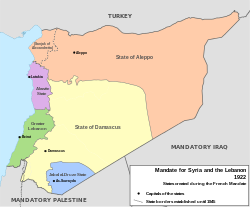Mandate of Lebanon
| State of Greater Lebanon | ||||||||||
|
État du Grand Liban دولة لبنان الكبير |
||||||||||
| Mandate of the French Third Republic | ||||||||||
|
||||||||||
|
Location of Greater Lebanon (green) within the Mandate of Syria and Lebanon.
|
||||||||||
| Capital | Beirut | |||||||||
| Languages |
French Arabic Armenian |
|||||||||
| Religion |
Christianity Islam |
|||||||||
| Political structure | League of Nations Mandate | |||||||||
| Historical era | Interwar period | |||||||||
| • | Declared under mandate | 1920 | ||||||||
| • | Independence | 1943 | ||||||||
| Currency |
Syrian pound (1920–39) Lebanese pound (1939–1943) |
|||||||||
|
||||||||||
The State of Greater Lebanon (Arabic: دولة لبنان الكبير Dawlat Lubnān al-Kabīr; French: État du Grand Liban) was a state declared on 1 September 1920, which became the Lebanese Republic (French: République libanaise) in May 1926, and is the predecessor of modern Lebanon.
The state was declared on 1st September 1920, following Decree 318 of 31st August 1920, as a League of Nations Mandate under the proposed terms of the French Mandate for Syria and Lebanon which was to be ratified in 1923. When the Ottoman Empire was formally split up by the Treaty of Sèvres in 1920, it was decided that four of its territories in the Middle East should be League of Nations mandates temporarily governed by the United Kingdom and France on behalf of the League. The British were given Palestine and Iraq, while the French were given a mandate over Syria and Lebanon.
General Gouraud proclaimed the establishment of the state with its present boundaries after splitting few Syrian villages on the southern and western borders with Lebanon and adding them to Lebanon and with Beirut as its capital. The new territory was granted a flag, merging the French flag with the Lebanese cedar.
...
Wikipedia


